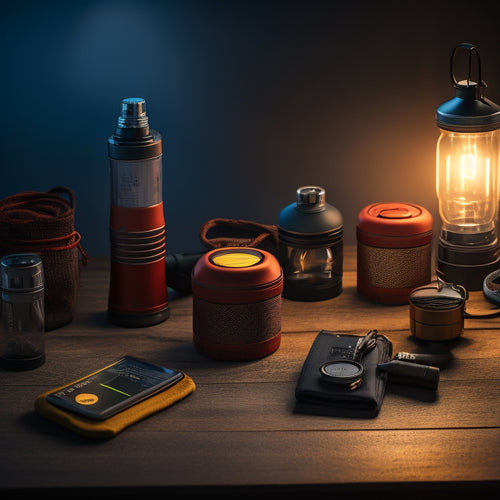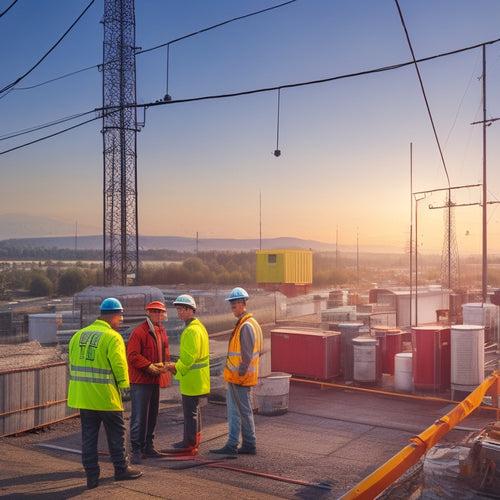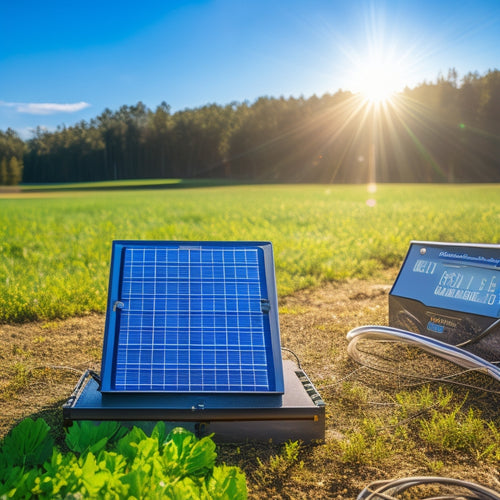
Solar and Battery Backup
Share
You can count on a solar and battery backup system to provide reliable power during outages, ensuring critical home systems like refrigeration and lighting stay operational. These systems are designed for prolonged outages, offering peace of mind and energy independence. With solar panels generating energy even when the grid fails, and battery backup providing an uninterrupted power supply, you'll have a steady source of power. By understanding your energy usage patterns and sizing your system correctly, you'll be well on your way to reducing energy expenses and living more sustainably - and there's more to investigate on how to optimize your setup for maximum benefit.
The Essentials
- Solar and battery backup systems provide reliable power during outages, ensuring critical home systems remain operational and offering energy independence.
- These systems reduce energy expenses and contribute to a more sustainable lifestyle by storing energy from solar panels and reducing reliance on the grid.
- Advanced battery management and inverter technology optimize system performance, extending battery life and ensuring clean, renewable energy.
- Proper maintenance of solar and battery backup systems is crucial for extending battery lifespan, ensuring system efficiency, and promoting sustainable energy practices.
- Solar and battery backup systems can be customized to meet specific energy demands and usage patterns, providing a tailored solution for homeowners.
Reliable Power During Outages
You need power when you need it, and that's exactly what a solar and battery backup system provides.
During outages, a reliable home battery backup system guarantees that critical home systems, such as refrigeration and lighting, continue to function smoothly, preventing food spoilage and maintaining safety.
With a well-designed system, you can expect backup that lasts longer, giving you peace of mind and protection from prolonged outages.
Power When You Need
When the grid goes down, every minute counts. You need reliable power to keep your lights on, your fridge running, and your family safe.
With a solar and battery backup system, you can rest assured that you'll have power when you need it most. This system combines the latest solar innovations with advanced battery technology to provide energy independence during outages.
By switching to a home solar power battery, you'll enjoy reduced energy expenses and the freedom to be less reliant on the grid, providing a cleaner, more sustainable, and self-sufficient lifestyle home energy storage.
When the grid fails, your solar panels will continue to generate energy, which is then stored in your battery bank. This stored energy is then used to power your home, providing you with a reliable source of electricity.
With a battery backup system, you can enjoy uninterrupted power, even during extended outages. You'll have the freedom to live life as usual, without worrying about the grid's reliability.
Backup That Lasts Longer
Solar and battery backup systems prioritize reliability, and their ability to provide extended backup power is a key advantage. When you're dealing with an outage, you want a system that can keep your essential appliances running for as long as possible.
A well-designed solar and battery backup system can do just that, providing you with the freedom to weather the storm without worrying about your power supply. By providing a reliable source of backup power during outages, keeping essential appliances and lights running even when the grid goes down, Home Backup Power systems can give you peace of mind.
Many homeowners have already made the switch to solar power backup systems, reducing their reliance on noisy, polluting generators and the hassle of refueling them.
The secret to extended backup power lies in the system's ability to optimize battery lifespan and solar efficiency. By maximizing the amount of energy your solar panels can generate, you can recharge your batteries faster and more efficiently. This means you'll have a steady supply of power, even during prolonged outages.
Additionally, advanced battery management systems can help extend the life of your batteries, ensuring they remain healthy and functional for years to come.
With a reliable solar and battery backup system, you can rest assured that you'll have the power you need, when you need it most.
Reduced Carbon Footprint Guarantee
You're likely looking for a solar and battery backup system that not only provides reliable power during outages but also helps reduce your carbon footprint.
By switching to residential solar panels, you can greatly reduce your energy bills and lower your reliance on the electrical grid.
With eco-friendly energy solutions, you can greatly decrease your reliance on fossil fuels and lower your emissions.
Eco-Friendly Energy Solutions
Renewable energy has become a top priority for environmentally conscious homeowners, and for good reason: traditional fossil fuels are rapidly depleting and contributing to climate change. As you shift to eco-friendly energy solutions, you're not only reducing your carbon footprint but also investing in sustainable practices for a better future.
| Renewable Resources | Benefits |
| Solar Energy | Zero emissions, abundant resource |
| Wind Energy | Low operating costs, minimal maintenance |
| Hydro Energy | Reliable, high energy conversion rate |
| Geothermal Energy | Consistent, low visual impact |
| Biomass Energy | Carbon neutral, waste reduction |
Cleaner Planet Today
By making the switch to eco-friendly energy solutions, homeowners can greatly reduce their carbon footprint, thereby contributing to a cleaner planet today.
With solar innovations, you can considerably decrease your reliance on fossil fuels, which are major contributors to greenhouse gas emissions. By utilizing the power of the sun, you'll not only reduce your carbon footprint but also enjoy lower energy bills.
As you shift to sustainable living, you'll be part of a movement that's making a real difference.
Solar energy is a clean, renewable source that's available everywhere, making it an ideal solution for homeowners seeking freedom from fossil fuels. By investing in solar panels and battery backup systems, you'll be able to store excess energy generated during the day for use at night or during power outages.
This means you'll have a reliable source of power, even when the grid goes down. With a reduced carbon footprint guarantee, you can rest assured that your decision to go solar is contributing to a cleaner, healthier planet for future generations.
Grid-Tie Inverter Explained
You're about to connect your solar panel system to the grid, and that's where the grid-tie inverter comes in. This device allows you to feed excess energy back into the grid, and it's essential to understand how it works.
As you consider your home energy storage options, you'll want to verify that your grid-tie inverter is compatible with your system. Specifically, you'll want to know how it interconnects with the grid and its efficiency ratings, which can greatly impact your system's overall performance.
Grid Power Interconnection
When connecting your solar panel system to the grid, an essential component comes into play: the grid-tie inverter. This device synchronizes your system's output with the grid's frequency and voltage, ensuring a safe and efficient transfer of energy.
To achieve this, the grid-tie inverter employs advanced grid synchronization techniques, such as phase-locked loops and frequency tracking algorithms. These techniques enable the inverter to precisely match the grid's waveform, allowing your solar panel system to feed energy back into the grid.
When it comes to interconnection standards, your grid-tie inverter must comply with regulations set by organizations like the Institute of Electrical and Electronics Engineers (IEEE) and the International Electrotechnical Commission (IEC).
These standards dictate the acceptable limits for voltage, frequency, and power quality, ensuring that your system operates in harmony with the grid. By meeting these interconnection standards, you can confidently connect your solar panel system to the grid, generating clean energy and offsetting your reliance on traditional power sources.
Inverter Efficiency Ratings
Your grid-tie inverter's efficiency rating is a critical specification that directly impacts the overall performance of your solar panel system. It measures how effectively the inverter converts DC power from your solar panels into AC power for your home. A higher efficiency rating means more of the sun's energy is converted into usable power, reducing energy losses and increasing your system's overall output.
When selecting an inverter, you'll come across different efficiency ratings for various inverter types. Here's a breakdown of the efficiency standards for common inverter types:
| Inverter Type | Efficiency Standard | Typical Efficiency Range |
|---|---|---|
| String Inverters | IEEE 1547 | 95-98% |
| Microinverters | UL 1741 | 95-97% |
| Power Optimizers | UL 1741 | 97-99% |
| Hybrid Inverters | IEEE 1547 | 94-96% |
When choosing an inverter, look for high efficiency ratings to maximize your solar panel system's energy production. Keep in mind that while higher efficiency ratings may come at a higher cost, they can lead to significant long-term energy savings.
Assess Your Energy Demands
You need to understand your energy usage patterns to determine the size of your solar and battery backup system.
To do this, you'll want to calculate your daily power requirements, including the wattage and duration of each device you plan to power.
Consider your energy storage needs, especially if you have energy storage units that require precise calculation.
Additionally, think about your charging needs, such as for an electric vehicle charging station.
This assessment will help you identify the total amount of energy you need to generate and store.
Energy Usage Patterns
Understanding energy usage patterns is vital in determining the required capacity of your solar and battery backup system. To do this, you need to assess your energy consumption and usage trends. Identify your peak hours, when you use the most energy, and consider how you can adjust your habits to optimize energy efficiency.
Renewable sources like solar power can help reduce your reliance on the grid, but you still need to manage your energy usage effectively.
Your lifestyle impacts and household habits play a significant role in your energy consumption. For instance, do you have energy-intensive appliances or devices that consume a lot of power? Are there ways to reduce their energy demand or optimize their usage?
Efficiency metrics such as energy usage per square foot or per capita can help you identify areas for improvement. By implementing demand response strategies, you can reduce your energy consumption during peak hours, which can also help you save money on your electricity bills.
Effective load management is vital to guarantee that your solar and battery backup system can meet your energy demands.
Daily Power Requirements
To determine the required capacity of your solar and battery backup system, it's necessary to calculate your daily power requirements. This involves evaluating your energy demands to guarantee you can meet your power needs during the day and night.
Calculate your energy consumption by identifying the appliances and devices you'll be powering, their individual wattage, and the number of hours they'll be used daily.
Add up the total watt-hours (Wh) required to power your devices during the day. Consider your energy usage patterns, such as peak usage during morning and evening hours. Don't forget to include standby power consumption from devices like TVs and computers. Effective power management is vital to optimize your energy consumption.
For example, if you need 2000Wh during the day, you'll want a solar panel system that can produce at least that amount of energy. Your battery backup system should also be able to store excess energy generated during the day for nighttime use.
Lower Operating Costs Guaranteed
You'll see a significant reduction in your energy bills with a solar and battery backup system, thanks to the capability to store excess energy generated during the day for use at night or during power outages.
This leads to energy savings that are guaranteed, as you're no longer reliant on the grid to power your home or business.
Energy Savings Guaranteed
Your investment in a solar and battery backup system comes with a guaranteed return: lower operating costs. By utilizing renewable energy from the sun, you'll reduce your reliance on the grid and decrease your energy bills.
You can take advantage of solar incentives and energy rebates to offset installation costs. With proper maintenance tips, your system will operate efficiently, and the battery lifespan will be extended. Financing options are available to make the shift to solar energy independence more accessible.
To guarantee peak energy savings, it's crucial to evaluate system sizing and local regulations. By choosing the right solar technologies for your needs, you'll maximize your energy production and savings.
With a well-designed system, you can enjoy energy independence and lower operating costs. By going solar, you'll not only reduce your energy expenses but also contribute to a cleaner environment.
Frequently Asked Questions
Can I Use My Existing Electrical Panel With a Solar System?
When upgrading to a renewable energy source, you'll need to determine if your existing electrical panel is compatible with a solar system installation; if it's not, you'll need to replace or upgrade it to guarantee a safe and efficient energy shift.
Do Solar Panels Generate Power During a Blackout?
When the lights go out, you're left in the dark, but do you know what's still shining bright? During a blackout, you won't receive power from solar panels alone, but with solar energy storage, you'll be prepared for blackout preparedness, capturing the power you need to shine on.
How Long Do Solar Batteries Typically Last?
You'll find that typical battery lifespan ranges from 5 to 15 years, depending on factors like depth of discharge, temperature, and maintenance; proper solar battery maintenance, like regular checks and updates, helps extend its lifespan and guarantees peak performance.
Can I Add More Batteries to My System Later?
You can always increase your battery capacity through system expansion, so don't worry if you need more power in the future - you can simply add more batteries to your existing setup, giving you the freedom to grow as needed.
Will My Solar System Work With a Well Pump?
"When in doubt, doubt not" - your well pump's compatibility with a solar system is an essential consideration. You'll need a system designed for high-torque, low-RPM pumps; ensuring solar pump compatibility and energy efficiency, giving you the freedom to utilize nature's power.
Final Thoughts
You've made it to the end of this solar and battery backup crash course, and guess what? You're now a certified expert (not really, but close enough). In all seriousness, with a grid-tie inverter and a solid understanding of your energy demands, you're ready to ditch those pesky utility bills and carbon emissions. Go ahead, bask in the glory of your newfound sustainability - and lower operating costs, of course. Now, go forth and solar-ize the world (or at least your neighborhood)!
Related Posts
-

Best Solar Powered Flashlights for Emergency Situations
When you're choosing the best solar-powered flashlights for emergency situations, focus on their brightness, battery ...
-

Smart Grid Technology Implementation Challenges
You'll encounter several challenges when implementing smart grid technology, particularly in cost management, scalabi...
-

Choosing the Right Solar Power Charge Controller
Choosing the right solar power charge controller is crucial for maximizing energy efficiency and extending battery li...


